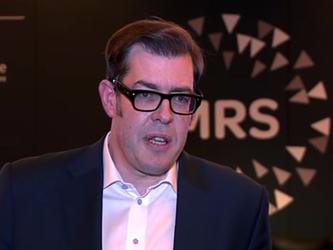Will technology make us all redundant?
Entitled “Will ‘curious computers’ replace ‘curious minds?” the panel debate did however remain grounded in reality, starting with that emotive question – whose job is most at risk?
Fifty people in the room responded to a quick poll – half didn't believe their job would be taken by a computer. Thirty-three per cent were unsure. Most revealing was that 18% of respondents within this elite group of senior executives agreed that they would become professionally obsolete.
Colin Strong, managing director of Verve Ventures started with the warning that while every profession thinks technology will disrupt jobs, no one thinks it’ll be their own. “Market research is high cost, and therefore low accessibility – not every organisation can afford it. We are reactive, and it takes time to execute research. These are all classic symptoms of a profession in danger of being disrupted.”
The rise of cognitive and anticipatory computing eliminates the need for humans to ask questions, Strong continued. Instead, computers can predict in real time our behaviour based on our personal data. “The customer-brand relationship is being mediated by technology – do you need to know what people think or do you just need to know how to nudge them?”
Market research believes we need to ask questions, Strong said, but the data can give us ideas that we then verify through AB testing. “Where are the questions in that?” he asked.
In a climate where clients expect faster and cheaper solutions, what seems inevitable is the impact on jobs.
“There’s been a lot of counting stuff in the industry and asking people about what they've done – but the more data we have the less we'll need to do of that,” said Nick Bonney, head of insight, Camelot.
Nick Baker, group CEO, Quadrangle agreed that the trail of personal data, particularly from mobile, was forcing the role of the researcher to change.
The exponential increase in data is already an area ripe with automation – BeyondCore was one solution referenced throughout the session and widely described as ‘quite scary’ in terms of its potential to integrate and interrogate multiple data sources and deliver actionable insight. But, said Baker, “there isn't a linear relationship between the use of data and corporate success…We are going to need to engage with the data scientists and analysts and combine with our ability to ask the right questions.”
“I believe there is only so far machines can go at creating” said Cat Wiles, board account planner, AMV BBDO. “The role of the researcher will need to shift to become more of a provocateur - joining up dots that aren't obvious. What the researchers can do is bring humanity and free will into business decisions.”
Empathy, said Wiles, creates ‘joy’ which is how brands make an emotional connection with consumers.
There was some debate as to whether the research sector was in a position in its current form to provide a higher level of business consulting needed to elevate itself above the many repetitive tasks that would inevitably get automated.
“The problem is we have an industry structured around a set of tools rather than a way of thinking. And if we define ourselves by the tools they are becoming rapidly out of date,” said Strong.
Those jobs most at risk in the short term would be “anyone doing counting or describing” said Bonney. Referencing Stan Stanunathan’s opening keynote at the conference, Bonney continued: “Action is the edge, as Stan said, and insight has become democratised. We should see this as an opportunity to raise our game and get to the action, and the ‘so what?’”
The future of research, said Bonney, would be “less about creativity and more about driving decisions for the client – and that is still going to be a person to person interaction.”
The MRS Delphi Group has commissioned a series of articles on this issue from industry leaders. You can read them here.

We hope you enjoyed this article.
Research Live is published by MRS.
The Market Research Society (MRS) exists to promote and protect the research sector, showcasing how research delivers impact for businesses and government.
Members of MRS enjoy many benefits including tailoured policy guidance, discounts on training and conferences, and access to member-only content.
For example, there's an archive of winning case studies from over a decade of MRS Awards.
Find out more about the benefits of joining MRS here.













0 Comments